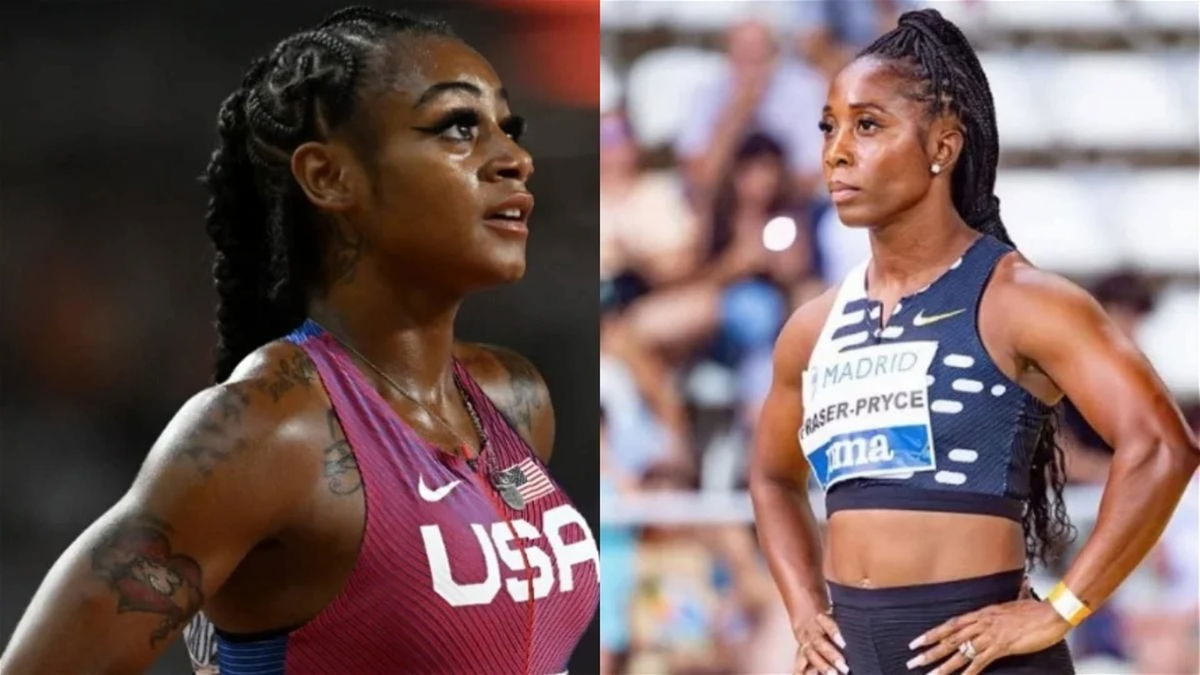

Can toking disqualify even the most elite athletes from the Olympics? Yes, it did in 2021. Sha’Carri Richardson’s Olympic dreams were derailed not by her athletic performance but by an outdated rule.
Watch What’s Trending Now!
Richardson secured her place on the U.S. Olympic team for Tokyo by excelling in the 100-meter with a time of 10.86 seconds. However, a positive doping test led to her disqualification, keeping her out of the Olympics. The rule was broken and enforced—case closed, right?
Yet, applying this outdated policy, especially since Herb isn’t a performance-enhancing drug for sprinters, seemed unjust. Recently, a debate flared up on X, where one user posted, “If you switched up on Sha’Carri Richardson last Olympics, stay on that side. She’s getting it back in blood this year. Stamp it.” This sentiment shows that three years have passed, but frustration still grows among fans who feel that Richardson’s suspension was harsh. Her current success, as she officially moves toward the Paris Olympics, should be celebrated without past grievances overshadowing it.
ADVERTISEMENT
I don’t think anyone switched up on her last Olympics…
She wasn’t there. What was people supposed to do, cheer for her sitting at home when she should have been in Tokyo but wasn’t due to breaking a rule that has kept even Athletes before her, like John Capel in 2004, out of… https://t.co/jNQM6HqcjJ
— Raes Take TV (@RaesTake) July 27, 2024
In response, another user commented, “I don’t think anyone switched up on her last Olympics… She wasn’t there. What were people supposed to do, cheer for her sitting at home? She missed Tokyo because she broke a rule that has kept athletes like John Capel in 2004 out of the Olympics for the same reason. Nobody switched up on her; she got suspended. It’s hard to cheer for someone who’s not competing. Just be happy she’s back now and leave it at that.”This situation mirrors the 2010 controversy faced by Shelly-Ann Fraser-Pryce, where she too was banned!
In 2010, Shelly-Ann Fraser, the three-time Olympic champion and ten-time world champion, received a six-month controlled-substance ban from the International Association of Athletics Federations (IAAF). The 36-year-old athlete tested positive for a Schedule II/IIN controlled substance at the Diamond League in 2010, attributing the result to medication she had taken for a toothache. The IAAF confirmed that Fraser would be sidelined until January 7, 2011.
ADVERTISEMENT
Shelly-Ann Fraser’s case garnered attention that year in 2010, as she became the eighth Jamaican athlete to test positive within a year with the prescription medication, though banned as a narcotic, not classified as a performance-enhancing drug or masking agent. Bruce James, president of her MVP Track and Field Club, defended Fraser by clarifying that the medication was prescribed post-dental procedure, not for performance enhancement.
But did anyone advocate on Sha’Carri Richardson’s behalf when she faced her ban?
ADVERTISEMENT
Was Sha’Carri Richardson’s suspension the cost of a slip-up?
The U.S. Anti-Doping Agency issued a 30-day suspension to Sha’Carri Richardson when she disclosed using Mary Jane during the 2021 trials in Oregon, where its recreational use is permitted as a way to deal with the passing of her birth mother. This action was taken due to the prohibition of THC/CBD-rich products by the World Anti-Doping Agency.
Advocates for CBD/THC legalization argue that Richardson’s case highlights the need for the U.S. to press international sports authorities to reconsider these rules. “America is the birthplace of harsh cann*bis policies and, like many things, we exported it around the world,” said Matthew Schweich. “There’s a lot that needs to be undone.”
ADVERTISEMENT

ADVERTISEMENT
Nevertheless, scholars like Mark Conrad, a professor specializing in law and ethics, warn that altering worldwide regulations regarding cannabinoids will prove to be a drawn-out endeavor. “I don’t think the world community will flip a switch on cann*bis rules just because the United States says it’s legal,” Conrad added.
Top Stories
Pro Suffers Disqualification at PGA Tour Q-School After Several Players Withdrew Abruptly

NFL Announces Hefty Punishment for Shedeur Sanders Incident

2025 Vic PGA Championship: Prize Money, Winner’s Payout & More Explored

Support Pours In From Phil Mickelson as ASU Football Coach Chokes Back Tears in Public

Jason Day Opens Up About Going Through Traumatic Childhood Just to Play Golf: ‘It Was Tough’

Forced to Leave FOX, Cowboys Legend Troy Aikman Says ESPN Is Like ‘U.S. Government’ & Clearly Distinguishes the Two Networks

THC-containing products have been banned by WADA since 2004 due to concerns about performance enhancement, health risks, and sportsmanship. Critics argue that WADA’s stance is inconsistent since substances like alcohol and nicotine, which have similar effects, are allowed. Matthew Schweich calls the ban hypocritical, noting that recent research shows no evidence of THC-enhancing performance. Retired Canadian hurdler Perdita Felicien adds that the ban is outdated and needs updating.
Three years have flown by since Sha’Carri Richardson’s suspension, and she has since turned the tables. She now has officially qualified for her first Olympics, the Paris Games, and earned the title of the fastest woman in the 100m in 2023 with a scorching time of 10.65. More recently, at this year’s Olympic Trials, Richardson dashed to first place in the 100m with a time of 10.71, clinching her spot in Paris.
ADVERTISEMENT
In a manner, Shelly-Ann Fraser Pryce, a sprinter boasting a 100m personal record of 10.60 seconds and a 200m best of 21.79 seconds, is scheduled to compete in the 100m qualifying round on Friday, August 2. She is poised to make an impact as she aims to progress to the semi-finals and finals on August 3, further solidifying her reputation in sprinting. It will be intriguing to witness the records that may unfold during the Paris Olympics this time!
ADVERTISEMENT
ADVERTISEMENT
ADVERTISEMENT

